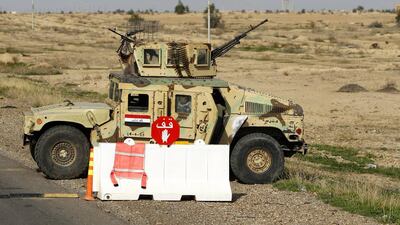Iranian warplanes recently launched airstrikes against targets in eastern Iraq, pushing back ISIL militants who had ventured near a self-declared “buffer zone” that Iran established along the border. It was the latest example of how Iran is expanding its military and political influence in Iraq, a country wracked by a complex civil war that leaves it open to outside manipulation.
Iraq is affected by several regional proxy battles: Iran is heavily involved in shaping Iraqi policy, while ISIL represents a spillover from the Syrian civil war next door. And the United States is bombing ISIL and other jihadist groups in both Iraq and Syria.
Iran is the regional player that has benefitted the most from US invasion of Iraq. After Saddam Hussein, Tehran’s sworn enemy, was ousted in 2003, Washington helped install a Shiite government for the first time in Iraq’s modern history. As US troops became mired in fighting an insurgency and containing a civil war, Iran extended its influence over all of Iraq’s major Shiite factions.
Today, Tehran is exerting influence beyond its Iraqi proxies, and is comfortable taking overt military action. There is no one to restrain Tehran, and the rise of ISIL, which views Shiites as apostates, threatens the interests of all Iraqi Shiite factions and the Iranian regime itself.
Tehran wants to ensure that Iraq never again poses an existential threat to Iran, as Saddam did when he invaded in 1980, instigating the eight-year Iran-Iraq war that devastated both countries. Saddam was supported by the Sunni Arab states and most Western powers. Iran will do whatever is necessary to keep a friendly, Shiite-led government in power in Baghdad.
Iran’s willingness to spread money around to various proxies and factions gave it great agility in manoeuvering through Iraqi politics. Soon after the US invasion, Tehran reached out to the Shiite cleric Muqtada al-Sadr – who was an early critic of Iranian meddling in Iraq – and financed his growing militia and social service networks.
One diplomatic cable sent by Christopher Hill, the US ambassador in Iraq, to officials at the State Department in November 2009 estimated that Tehran’s financial assistance to its Iraqi surrogates ranged from $100 million to $200 million a year.
The Islamic Republic was also willing to invest across sectarian lines, he noted, adding: “[Iran] recognises that influence in Iraq requires operational (and at times ideological) flexibility. As a result, it is not uncommon for [Iran] to finance and support competing Shia, Kurdish, and to some extent, Sunni entities, with the aim of developing the Iraqi body politic’s dependency on Tehran’s largesse”.
Iran helped fuel and prolong the Iraqi insurgency and the civil war. The Iranian Revolutionary Guards financed, armed and trained numerous Shiite militias, which targeted US troops and Iraq’s Sunni community. The Iranians provided rockets, explosives, machine guns and other small arms. They also brought Iraqi militiamen to Iran to be trained in the use of explosives and as snipers.
The US helped Iraq’s Shiite factions compromise on Nouri Al Maliki as prime minister in 2006. As Mr Maliki struggled to remain in power, he became more dependent on Iran. He grew more repressive and authoritarian, using the Iraqi security forces to intimidate political rivals and exclude Sunnis from power.
For Iran, Mr Maliki was a reliable ally who allowed Iranian flights to cross Iraqi territory to transport weapons and manpower to shore up Bashar Al Assad’s regime in Syria after the popular uprising began in 2011. Mr Maliki also allowed thousands of Iraqi Shiites to cross the border and fight alongside the Syrian regime.
In recent months, US officials say Tehran has provided tons of military equipment to the Iraqi security forces and has been secretly directing surveillance drones from an airfield in Baghdad. Iran has also sent hundreds of its Quds Force fighters to train and coordinate Iraqi forces.
However last month was the first time that Iran used its fighter jets to directly bomb ISIL targets inside Iraq, striking in eastern Diyala province near the Iranian border.
Iraqi leaders warned that if the United States did not provide military assistance, they had no choice but to ask Iran.
“When Baghdad was threatened, the Iranians did not hesitate to help us,” Iraqi prime minister Haider Al Abadi said recently in an interview in Baghdad.
Iran will not hesitate to expand its influence in Iraq, even if that means taking on a deeper military role in a civil war that has no end in sight.
Mohamad Bazzi is a journalism professor at New York University and a former Middle East bureau chief at Newsday.
On Twitter: @BazziNYU

